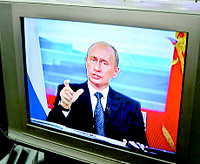
Russian President Vladimir Putin on Tuesday ruled out seeking a third term as the top leader of the country he has headed since 2000 and stood firm on the sovereignty of the Kurile Islands to which Japan has claimed ownership.
During a nationally televised live call-in show, where he reached out to Russians and took questions from students, pensioners, war veterans and others, Putin said he does not favor "drastic changes to laws, above all to the constitution," which bars him from running for a third term in 2008.
"My task, as I see it, is not to sit in the Kremlin forever, but to create the conditions for the country's long-term development," Putin said. "As for me personally, I'll find my place in line, as they say."
The remark was the latest of Putin's promises that he would not seek a third term as president.
The Russian leader said he does not believe bureaucracy sabotages his decisions and promised he will heed their implementation more attentively.
"I must give more attention to all this and be more scrupulous in ensuring all decisions are brought to their logical end and implemented," Putin said.
Answering a question from a student on the Kurile Islands, to which Japan has long been claiming ownership, Putin ruled out any negotiations over the sovereignty.
"Four Kurile islands are under Russian sovereignty. This has been fixed by international law. This is a result of World War II. In this regard, we are not going to discuss anything, we are conducting negotiations from this standpoint," Putin said.
But he also said that Moscow is prepared to look for a solution to the dispute with Japan suitable for both countries.
"We want to settle all disputes with all neighbors, including Japan. We want to find a solution that would suit both countries. Such a solution can be found," Putin said.
The Kurile Islands, a small group of islands located north of Horraido in Japan, the Kuriles have been claimed by Russia and Japan since the end of the World War II. Japan has demanded that Russia cede sovereignty of the islands.
During the three-hour program, which has become an almost annual ritual for the president, Putin also hailed the performance of the Russian economy.
"The Russian economy has expanded by almost seven percent year-on-year. This pace is significantly faster than in many developed countries and countries with transitional economies. We may not be the absolute leader, but we are certainly amongst the leaders," Putin said.
Earlier official statistics showed that the Russian economy grew 5.7 percent year-on-year in the first half of 2005, beating previous forecasts. The growth was slower than achieved in the same period a year ago, when Russia's economy expanded 7.6 percent.
Keen to translate the windfall of oil revenues into higher living standards in the country, Putin has proposed spending an additional 115 billion rubles (about US$ four billion) in 2006 on social problems.
Real income growth stands at 8.5-10.0 percent a year and pensioners' income has been growing 5.0-5.5 percent annually and will be slightly higher this year, Putin said.
(Xinhua News Agency September 28, 2005)
|

